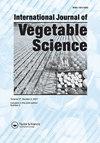用富含海藻提取物的水灌溉以克服“新红火”叶莴苣种植中的盐度影响
IF 1.1
Q2 Agricultural and Biological Sciences
引用次数: 3
摘要
莴苣对盐分敏感,盐分水平对产量有负面影响。本研究旨在研究富含海藻提取物的水在“新红火”叶莴苣种植中克服盐度影响的效果。在EC 7和1.37 dS m−1条件下,用盐水灌溉的植物叶片游离脯氨酸含量最高和最低。将水分EC水平从2.5 dS m−1提高到4 dS m–1,可使叶片可溶性固形物总含量增加9.3%。小球藻海藻溶液处理的植物叶片维生素C含量最高。盐度水平可分为三组:1.37和2.5 dS m−1(破坏最小)、4和5 dS m–1(耐受阈值)和7 dS m-1(破坏最大)。小球藻海藻溶液可中和盐度对植物鲜重、游离脯氨酸含量、可溶性固形物总含量、光合色素含量、自由基清除活性、花青素含量、酚和类黄酮含量、过氧化物酶活性和叶片维生素C含量的不利影响。强烈建议用富含小球藻海藻提取物的水灌溉“新红火”,以克服盐度对莴苣形态和生理特性的影响。盐度水平高于5 dS m−1会严重损害“新红火”的定性和定量特性。本文章由计算机程序翻译,如有差异,请以英文原文为准。
Irrigation with water enriched with seaweed extract to overcome effects of salinity in ‘New red fire’ leafy lettuce cultivation
ABSTRACT Lettuce (Lactuca sativa L.) is salt-sensitive, and salinity level can negatively affect yield. The study was conducted to investigate effect of water enriched with seaweed extract to overcome effects of salinity in ‘New Red Fire’ leafy lettuce cultivation. The highest and lowest leaf free proline content was in plants irrigated with saline water at EC 7 and 1.37 dS m−1. Increasing water EC level from 2.5 to 4 dS m−1 resulted in 9.3% increase in leaf total soluble solid content. The highest leaf vitamin C content was in plants treated by Chlorella vulgaris seaweed solution. Salinity levels could be classified into three groups: 1.37 and 2.5 dS m−1 (least damaging), 4 and 5 dS m−1 (tolerance threshold) and 7 dS m−1 (most damaging). Chlorella vulgaris seaweed solution appeared to neutralize adverse effects of salinity on plant fresh weight, free proline content, total soluble solid content, photosynthetic pigments content, radical scavenging activity, anthocyanin content, phenol and flavonoid content, peroxidase enzyme activity and leaf vitamin C content. Irrigation ‘New Red Fire’ with water enriched with Chlorella vulgaris seaweed extract is strongly recommended to overcome effects of salinity on lettuce morphological and physiological characteristics. Salinity levels higher than 5 dS m−1 can seriously damage ‘New Red Fire’ qualitative and quantitative properties.
求助全文
通过发布文献求助,成功后即可免费获取论文全文。
去求助
来源期刊

International Journal of Vegetable Science
Agricultural and Biological Sciences-Plant Science
CiteScore
3.10
自引率
0.00%
发文量
30
期刊介绍:
The International Journal of Vegetable Science features innovative articles on all aspects of vegetable production, including growth regulation, pest management, sustainable production, harvesting, handling, storage, shipping, and final consumption. Researchers, practitioners, and academics present current findings on new crops and protected culture as well as traditional crops, examine marketing trends in the commercial vegetable industry, and address vital issues of concern to breeders, production managers, and processors working in all continents where vegetables are grown.
 求助内容:
求助内容: 应助结果提醒方式:
应助结果提醒方式:


